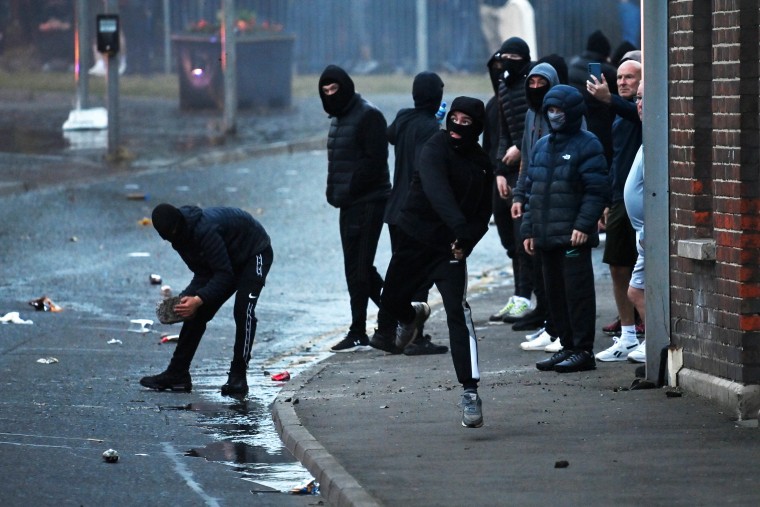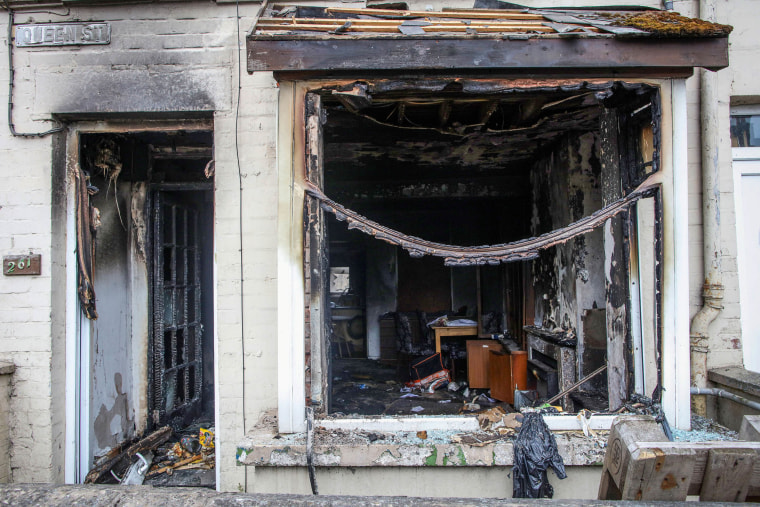Northern Ireland ‘racist’ riots target immigrants in Ballymena

LONDON — Dozens of mostly young men torched homes and smashed in windows in a Northern Irish town late Wednesday, in a third night of what officials described as coordinated “racist thuggery” against the community’s ethnic minorities.
Some residents of Ballymena, a town about 25 miles northwest of Belfast with a population of 30,000, responded to the anti-foreigner vigilantism by sticking the Union Jack or signs in their windows reading “British household” and “locals live here” in an apparent attempt to be spared by the rioters.
NBC News’ British partner Sky News has seen residents from ethnic minorities packing up suitcases and leaving their homes, while others have spoken of their terror that the mob violence will continue.
The violence first flared Monday during a vigil for a teenage girl who was the victim of an alleged sexual assault two days before. Two teenage boys, both 14, were charged with attempted rape and appeared in court Monday, communicating through a Romanian translator. The boys’ identities have not been released because of their age.
Masked rioters broke away from the otherwise peaceful vigil, building barricades and throwing bricks, Molotov cocktails and fireworks at houses and police.
Riot police responded with rubber bullets and a water cannon. More than 40 officers have been injured over the three nights, the Police Service of Northern Ireland, known as the PSNI, said.

The violence also spread to other towns in Northern Ireland, such as Coleraine, where a bus station was attacked, access to the train station was blocked and rioters pushed trash cans onto the rails and set them alight Wednesday night, police said.
In Larne, some people whose homes were destroyed were given shelter at a leisure center — until that was targeted and set on fire, too.
In total, 10 people, all men in their teens, 20s and 30s, have been arrested. Three of them, aged 18, 17 and 15, have been charged and are set to appear in court Thursday.
“This violence was clearly racially motivated and targeted at our minority ethnic community and police,” Ryan Henderson, PSNI assistant chief constable, said Tuesday at a news conference. “It was racist thuggery pure and simple and any attempt to justify and explain it as something else is misplaced.”
A Bulgarian national who lives in Ballymena and asked that her identity be protected told Sky News, “It’s terrifying, honestly, I’m scared to get out of the house,”
She said she had been in Northern Ireland “for a while — I’ve pursued an education here,” she said. “I’ve done multiple things for the community and it’s just absolutely heartbreaking that it’s not the same Ballymena that I had when I first came here.”
“It is important,” said Sunder Katwala, director of British Future, a think tank that focuses on immigration, identity and integration, “to draw the clearest red line between the legitimate debate about immigration policy, including numbers, the pace of change and the quality of integration, and hateful abuse and threats.”
“Governments need to manage asylum much better nationally and locally,” he said, “but must challenge more forcefully those stoking hatred and socializing violence against migrants, and the platforms that let hatred run riot without impediment.”

Northern Ireland is no stranger to unrest, but usually between “unionists” — mostly Protestants who want Northern Ireland to remain part of the United Kingdom — and “republicans” — mostly Catholics who want it to become part of the Irish Republic.
Though this conflict, called “the Troubles,” officially ended with a peace deal in 1998, sporadic clashes still break out between these often segregated communities and police.
This week’s unrest in Ballymena follows a different trend, however. Anti-foreigner sentiment has in recent years surged across the U.K. and indeed Europe and the West.
As prices for food, fuel and housing rise due to inflation, and public services become squeezed, some politicians mainly on the populist hard-right have sought to blame mass immigration for putting undue stress on the system.
Pro-immigration progressives argue that immigrants provide an essential net benefit to society, both bringing high-level skills and filling less glamorous but necessary jobs.
Last summer, anti-immigrant violence flared across the U.K. after three young girls were stabbed to death at a Taylor Swift-themed dance party in the town of Southport in northwest England.
Online misinformation wrongly identified the British-born attacker as an immigrant.


